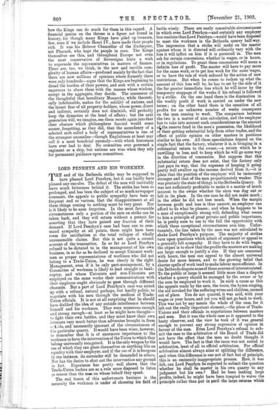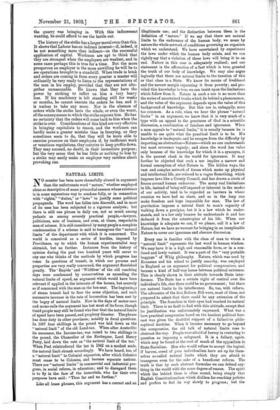LORD PENEHYN AND HIS WORKMEN. T HE end of the Bethesda
strike may be supposed to have pleased Lord Penrhyn, but it can hardly have pleased any one else. The defeat of the men will inevitably leave much bitterness behind it. The strike has been so prolonged, and has been the subject of so much newspaper comment, the appeals to public sympathy have been so frequent and so various, that the disappointment at all these things coming to nothing must be very great. Nor is it likely to be soon forgotten. In the most favourable circumstances only a portion of the men on strike can be taken back, and they will return without a pretext for asserting that they have gained any fraction of their demand. If Lord Penrhyn's case had been one to com- mand sympathy at all points, there might have been room for satisfaction at the total collapse of wholly unreasonable claims. But this is not quite a correct account of the transaction. In so far as Lord Penrhyn refused to be dictated to in the management of his own business, in so far as he declined to accept Unionist work- men as proper representatives of workmen who did not belong to a Trade-Union, he was clearly in the right. Management, even if it be only part-management, by a Committee of workmen is likely to lead straight to bank- ruptcy, and where Unionists and non-Unionists are employed on the same works their communications with their employer ought obviously to pass through different channels. But a part of Lord Penrhyn's case was mixed up with a refusal, natural perhaps, but hardly politic, to negotiate with his men through the medium of Trade- Union officials. It is not at all surprising that he should have disliked the idea of any outside interference between himself and his workmen. They were numerous enough and strong enough—at least so he might have thought— to fight their own battles, and they must know their own interests very much better than advocates brought in from ot Cide, and necessarily ignorant of the circumstances of the particular quarry. It would have been wiser, however, to remember that it is of enormous importance to the workmen to have the intervention of the Union to which they belong universally recognised. It is the only weapon by the use of which they can place themselves on anything like an equality with their employer, and if the use of it is foregone in one instance, its surrender will be demanded in others. Nor has the desire to shut out the intervention any ground in fact. Experience has pretty well shown that the Trade-Union leaders are as a rule more disposed to listen to reason than the man on whose behalf they speak.
The real lesson of this unfortunate business is the necessity the workman is under of choosing his field of battle wisely. There are easily conceivable circumstances in which even Lord Penrhyn—and certainly any employer less resolute than Lord Penrhyn—would have been disposed to meet the workmen in the Bethesda quarry half-way. The impression that a strike will make on the master against whom it is directed will ordinarily vary with the loss it will inflict on him if it is persisted in. The men ask for certain concessions, whether in wages, or in hours, or in regulations. To grant these concessions will mean a definite loss of profit. The master will have to pay more for the same work, or to get less work for the same wages, or to have the tale of work reduced by the action of new restrictions. But when he comes to reckon up what the amount of this loss will be, he has to set by the side of it the far greater immediate loss which he will incur by the temporary stoppage of the works if his refusal is followed by a strike. On the one hand there is the diminution in the weekly profit if work is carried on under the new terms ; on the other hand there is the cessation of all profits for an unknown number of weeks consequent on the men ceasing to work. The comparison between the two is a matter of nice calculation, and the employer has to take into account such considerations as the amount of,the reserve fund in the men's possession, the likelihood of their getting substantial help from other trades, and the effect of public opinion on other masters in positions similar to his own. All these speculations depend on the single fact that the factory, whatever it is, is bringing in a substantial return to the owner,—a return which he is unwilling to lose, and to keep which he will go some way in the direction of concession. But suppose that this substantial return does not exist, that the factory only just pays its way, that the expenses of keeping it going pretty well swallow up the income derived from it,—it is plain that the position of the employer will be immensely stronger and that of the men proportionately weaker. This was precisely the state of things in the Bethesda Quarry. It was not sufficiently profitable to make it a matter of much interest to the owner whether the slate was dug out or left in its place. In the one case he did not make much ; in the other he did not lose much. When the margin between profit and loss is thus narrow, an employer can afford to do what he pleases ; and when he happens to be a man of exceptionally strong will, defending what seems to him a principle of great private and public importance, he is pretty sure to use to the full the opportunity with which these exceptional circumstances arm him. Unfor- tunately, the line taken by the men was not calculated to shake Lord Penrhyn's purpose. The majority of strikes turn upon questions which admit of argument or appeal to a generally felt sympathy. If they have to do with wages, the object is to show that the profits the masters are making are large enough to justify a rise. If they are concerned with hours, the men can appeal to the almost universal desire for more leisure, and to the growing belief that shorter spells of work tend to make labour more efficient. In the Bethesda dispute none of these sources of interest existed. To the public at large it seemed little more than a dispute whether a quarry should be managed by the owner or by the men he employed to work it. In such a cause as this the appeals made by the men, the tours, the hymn-singing, the aid invoked for the suffering wives and children, seemed out of place. You do not quarrel, it was said, with your wages or your hours, and yet you will not go back to work. This was not by any means the whole of the case, for it left out the really important element,—the place of Trade- Unions and their officials in negotiations between masters and men. But it was the whole case as it appeared to the hasty observer, and the view he took of it was general enough to prevent any strong expression of opinion in favour of the men. Even Lord Penrhyn's refusal to sub- mit the case to the arbitration of the Board of Trade did not have the effect that the men no doubt thought it would have. The fact is that the issue was not suited to arbitration, least of all to official arbitration. For official arbitration almost always aims at splitting the difference, and when this difference is one not of fact but of principle, this is an eminently inappropriate process. How, it was felt, can Lord Penrhyn be expected to submit the question whether he shall be master in his own quarry to any judgment but his own ? Had he been making large profits, indeed, he might have been tempted to waive the principle rather than put in peril the large returns which
the quarry was bringing in. With this inducement wanting, he could afford to see the battle out.
The history of the strike has a larger moral even than this. It shows that Labour has an indirect interest—if, indeed, it be not something more than indirect—in the successful application of capital. Workmen are apt to think that they are strongest when the employers are weakest, and in some cases perhaps this is true for a time. But the more prosperous an employer is the more unwilling he will be to see operations brought to a standstill. When trade is brisk and orders are coming in from every quarter a master will ordinarily be very ready to listen to the representations of the men in his employ, provided that they are not alto- gether unreasonatle. He knows that they have the power by striking to inflict on him a very heavy loss. If his machinery is left standing still for weeks or months, he cannot execute the orders he has, and it is useless to take any more. Nor is the absence of orders while the strike lasts the whole, or even the worst, of the consequences to which the strike exposes him. He has no certainty that the orders will come back to him when the strike is over. Considerations of this kind are very effective in bringing capitalists to reason, and the workmen can hardly make a greater mistake than in fancying, as they sometimes seem to do, that they will be more able to - exercise pressure on their employers if, by inefficient work or vexatious regulations, they contrive to keep profits down. They may succeed, no doubt, in their immediate purpose; but the very sense that he has little or nothing to lose by a strike may easily make an employer very careless about provoking one.



























































 Previous page
Previous page